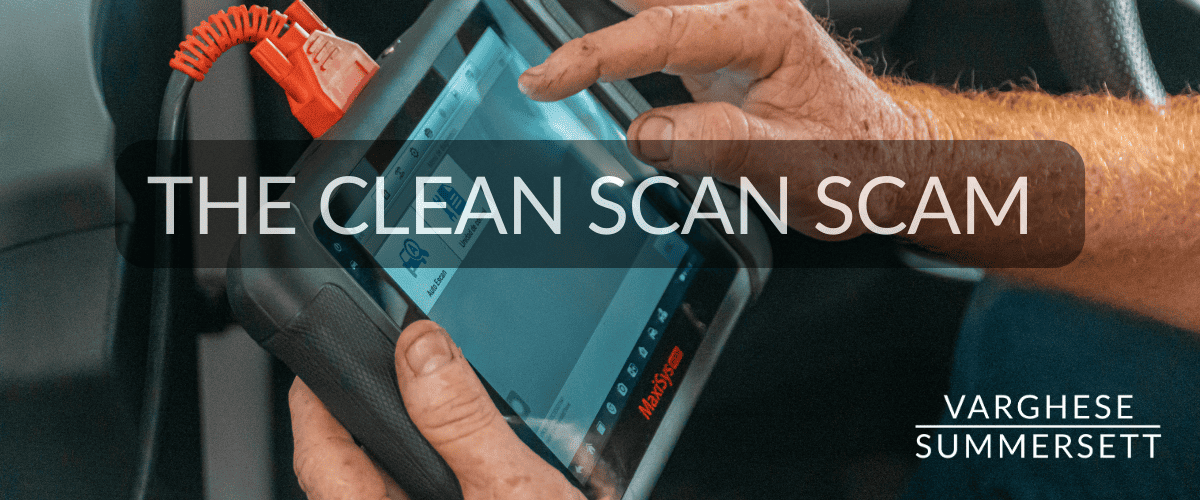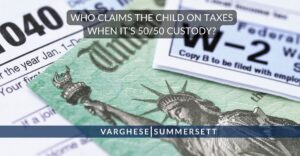If you have been paying attention to the news lately, you’ve probably heard about Texas law enforcement cracking down on fake vehicle inspections, or the so-called “Clean Scanned” scam. This scam involves issuing fraudulent motor vehicle inspections to allow vehicles to pass inspection even if they do not meet Texas’ safety and emissions requirements.
This scam is widespread in Texas, with reports suggesting that tens of thousands of cars may be on the road with fake vehicle inspections. Those caught issuing fraudulent motor vehicle inspections in Texas can face serious charges, including the felony charge of tampering with a government document.
In this article, our experienced North Texas defense attorneys explain the clean scanned scam, including possible offenses that stem from this illegal practice, the potential punishment range, and the collateral consequences of faking vehicle inspections.
It’s important to note that during the 2023 Texas legislature, lawmakers passed a bill to end the requirement for mandatory vehicle safety inspections. However, 17 counties in Texas will still require annual emissions testing, including Tarrant, Dallas, Denton and Colling counties.

Texas “Clean Scan” Scam
Clean Scanning is a term used to describe the practice of issuing fake vehicle inspections to vehicles that otherwise would not meet safety or emission standards. Basically, an inspection station/inspector issues a passing inspection certificate to a vehicle that has not actually been inspected. This is typically done by plugging an analyzer, which is used to check a vehicle emissions system, into a car that will pass the inspection. The passing result is then attached to the vehicle that has previously failed or showed equipment malfunctions.
In most cases, the car needing an emissions test does not have to be physically present at the inspection station in order for the fraudulent inspection to be issued. These days, inspectors obtain the necessary identifying vehicle information and then use a simulator device, similar to a flash drive, and plug it into the emissions analyzer instead of the vehicle. The device imitates the vehicle’s onboard diagnostic system and can be programmed to ensure that the vehicle will pass inspection – that is, get a “clean scan.” Fraudulent emissions certificates are then uploaded into the state’s system.
Texas Vehicle Safety and Emission Standards in Texas
Even though legislation was passed in 2023 eliminating inspections, the law does not go into effect until January 1, 2025. And even when it does go into effect, it will not apply to vehicles in 17 Texas counties – including Tarrant, Dallas, Johnson, Denton and Collin counties. They are still required to comply with federally mandated clean air requirements.
Vehicle inspections are performed at official Vehicle Inspection Stations licensed by the Department of Public Safety and must have a passing vehicle inspection in order to renew the vehicle’s annual registration and obtain a vehicle registrations sticker. Texas DPS is responsible for regulating and enforcing the state’s vehicle inspection program, while the Texas Commission on Environmental Quality (TCEQ) is responsible for regulating and enforcing emission standards.
Vehicle Safety Standards In Texas
Texas requires all vehicles to undergo a comprehensive safety inspection every year. Inspectors check for functioning brakes, headlights, taillights, turn signals, windshield wipers, and mirrors. In addition, vehicles with certain modifications, such as aftermarket exhaust systems, may be required to meet additional safety standards.
Vehicle Emission Testing In Texas
Vehicle emissions inspections are currently required in the following 17 Texas counties to improve air quality: Brazoria, Collin, Dallas, Denton, El Paso, Ellis, Fort Bend, Galveston, Harris, Johnson, Kaufman, Montgomery, Parker, Rockwall, Tarrant, Travis, and Williamson.
Texas uses a two-part emissions testing program for gasoline-powered vehicles that includes an On-Board Diagnostic (OBD) test and a visual inspection of emissions control equipment. This test involves connecting a diagnostic tool to the vehicle’s OBD system to check for any emissions-related faults or malfunctions. The purpose of the OBD test is to ensure that the vehicle’s onboard computer system is functioning properly and that there are no emissions-related issues that could contribute to air pollution. Diesel-powered vehicles undergo a similar emissions testing program, but with an additional opacity test to measure visible smoke emissions.
Overall, the state of Texas has strict standards for vehicle emissions and safety, which are in place to help protect public health and safety, promote environmental sustainability, and ensure compliance with federal regulations. Violations of these standards can lead to serious legal consequences.

The Criminal Consequences of Fake Vehicle Inspections
Those who are caught issuing or possessing fake vehicle inspections in Texas can face criminal charges. Two of the most common charges that stem from fake vehicle inspections in Texas include:
Fraudulent Emissions Inspection Of Motor Vehicle
Under Section 548.6035 of the Texas Transportation Code, a person commits fraudulent emissions inspection of a motor vehicle if he or she knowingly:
1. submits information to the department’s inspection database stating that a vehicle has passed the applicable inspections or issues a passing vehicle inspection report, if:
- the vehicle does not meet the emissions requirements established by the department; or
- the person has not inspected the vehicle;
2. manipulates an emissions test result; 3. uses or causes to be used emissions data from another motor vehicle as a substitute for the motor vehicle being inspected; or 4. bypasses or circumvents a fuel cap test.
This offense is generally a Class B misdemeanor punishable by up to 180 days in jail and a maximum $2,000 fine. However, the charge can be elevated to a Class A misdemeanor, punishable by up to a year in jail and a maximum $4000 fine if the defendant is a repeat offender. If the defendant intended to harm or defraud another person, the charge can be bumped up to a state jail felony punishable by six months to two years in a state jail facility and a maximum $10,000 fine.
Tampering With A Government Document
A vehicle inspection certificate is considered a government document so making, presenting, or using it with knowledge of its falsity is also illegal under Section 37.10 of the Texas Penal Code. Tampering with a government document is a third-degree felony punishable by 2 to 10 years in prison and a maximum $10,000 fine.
It is possible for defendants to also face federal charges of Violating the Clean Air Act for falsifying emissions testing. In 2013, six Arlington men were sentenced in the federal system for their role in circumventing the required emissions testing procedures by substituting vehicles that would pass the emissions test in place of vehicles that had previously failed or showed equipment malfunctions. Three men were sent to federal prison, while three received federal probation. If you are facing allegations related to fake vehicle inspections, it is important to seek the help of an experienced criminal defense attorney who can vigorously defend you and work to mitigate the consequences of the charge against you.
Collateral Consequences of Fake Vehicle Inspections
In addition to facing criminal charges, station owners and inspectors risk license suspension or revocation. For example, in March 2023, DPS announced that it had suspended or revoked 412 vehicle inspection stations and 532 inspectors during “Operation Cinderblock” – a regulatory and criminal operation targeting stations and inspectors who were “clean scanning vehicles instead of conducting the required emissions test during the inspection process.”
The department said it was increasing enforcement, working in partnership with the Texas Commission on Environmental Quality, and anticipated removing approximately 700 more inspectors. As mentioned, vehicle emissions inspections are currently required in 17 Texas counties to improve air quality and are integrated with the annual safety inspection program, regulated by DPS in conjunction with TCEQ.
The department licenses over 5,500 emissions inspection stations and more than 19,400 inspectors in those counties. Individual inspectors must also be licensed by the DPS and must pass a certification test in order to perform vehicle emissions inspections.
The DPS also provides ongoing training for inspectors to ensure that they are up-to-date on the latest regulations and technology related to vehicle emissions. The DPS takes vehicle emissions and safety standards extremely seriously. If a station owner or inspector is in violation, they could face license revocations ranging from a 12-month suspension to a lifetime revocation, depending on prior enforcement history.

Motives Behind Obtaining a Fake Vehicle Inspection in Texas
The reasons why drivers seek fake vehicle inspections in Texas vary. Here’s some common reasons behind obtaining fake inspection stickers in Texas, including:
Financial Reasons
Some vehicle owners seek fake inspection stickers in order to avoid the cost and inconvenience of making necessary repairs to their vehicles in order to pass the inspection. This can allow them to continue driving their vehicle without addressing any safety or emissions issues.
Selling Unsafe Vehicles
Individuals who sell vehicles with fake inspection stickers may do so in order to avoid having to make costly repairs to the vehicle in order to pass inspection. This can allow them to sell unsafe vehicles to unsuspecting buyers.
Evading Law Enforcement
Fake inspection stickers can allow individuals to evade law enforcement by making it more difficult for law enforcement to identify vehicles that are not in compliance with state safety and emissions standards. For example, if a vehicle has a fake inspection sticker that indicates that it has passed a state inspection for safety and emissions, a law enforcement officer who is conducting a routine traffic stop may be less likely to check the vehicle’s compliance with state standards, assuming that the vehicle is in compliance because of the inspection sticker. This false sense of legitimacy can make it easier for individuals to avoid detection by law enforcement and to continue driving vehicles that are not in compliance with state standards.
Fraudulent Activities
Having a fraudulent vehicle registration can enable people to engage in other fraudulent activities because it provides a false sense of legitimacy and makes it easier to evade detection by law enforcement. For example, individuals with fraudulent vehicle registrations may be able to obtain fraudulent insurance policies, evade toll road fees, or engage in other activities that require proof of vehicle ownership and registration. Of course, whenever there is a black market for something then you will find people – in this case inspectors and inspection stations – willing to capitalize on it. There is money to be made by those who sell fake inspection stickers.
Accused of Car Inspection Scam in North Texas? Contact Us.
The DPS and other law enforcement agencies take fake inspections seriously and will try to make an example out of people they arrest for fake vehicle inspections. That’s why it is so important to have a skilled defense attorney in your corner as soon as possible if you are arrested or under investigation for clean scanning.
At Varghese Summersett, we have the experience and expertise to investigate the allegations against you, challenge the evidence presented by the prosecution, and fight to protect your future. In addition to possible jail time and fines, you may also face collateral consequences such as license suspension, loss of employment, difficulty finding future employment, and damage to your reputation. We will work tirelessly to produce the best possible outcome. Call us today at 817-203-2220 for a free consultation.

What crackdowns have been related to fake vehicle inspections in Texas?
Fake vehicle inspection crackdowns are not new. Over the past decade, Texas DPS and other law enforcement agencies have been investigating and making arrests related to fraudulent motor vehicle inspections. Some of the operations related to the “clean scanned” scam in Texas include:
Operation Cinderblock: In August 2022, the Texas DPS announced its crackdown on fraudulent vehicle inspections and inspectors through “Operation Cinderblock.” The operation focused on vehicle inspection stations and inspectors who were potentially “clean scanning” vehicles instead of conducting the required emissions test during the inspection process. To date, the department has suspended or revoked 412 vehicle inspection stations and 532 inspectors as part of Operation Cinderblock.
Operation Sticker Shock: One of the most notable crackdowns was Operation Sticker Shock in 2016, which was a statewide enforcement effort aimed at identifying and prosecuting those involved in fraudulent motor vehicle inspections. The operation resulted in the arrest of numerous individuals, including some inspectors and shop owners, who were found to be involved in the scam.
Operation Dirty Air: In 2019, a multi-agency investigation called Operation Dirty Air was launched to target air quality emissions violations, including fraudulent inspections, in the Houston area. This operation resulted in several arrests and the shutdown of several inspection stations that were found to be issuing fake inspections.
These are just a few examples of the crackdowns related to the “clean scanned” inspection scam in Texas. The DPS and other law enforcement agencies are actively investigating and prosecuting those involved in issuing fake inspections. If you are facing allegations related to this scam, it is important to contact an experienced criminal defense attorney who can help protect your rights and fight for your best possible outcome.
Can a car dealer sell a vehicle without a valid inpsection sticker in Texas?
No, it is illegal for a car dealer to sell a vehicle without a valid inspection sticker in Texas. All vehicles that are driven on public roads in Texas must have a valid inspection sticker that certifies that the vehicle has passed a state inspection for safety and emissions. Dealers are required to ensure that the vehicles they sell have a valid inspection sticker before transferring ownership to a new owner. If you are purchasing a vehicle from a dealer, it is important to ensure that the vehicle has a valid inspection sticker before completing the purchase.
Can I register a car without an inspection sticker in Texas?
No, it is not possible to register a car without an inspection sticker in Texas. Before a vehicle can be registered in Texas, it must undergo a state inspection to ensure that it meets certain safety and emissions standards. Therefore, it is necessary to have a valid inspection sticker before attempting to register a car in Texas.
What’s the difference between a fake inspection scam and fake license plate scam in Texas?
A car inspection scam in Texas involves issuing or possessing a fake inspection certificate or using fraudulent means to obtain a passing result on a vehicle emissions or safety inspection. The goal of the scam is to avoid the cost and inconvenience of making necessary repairs to a vehicle to ensure that it passes the inspection.
On the other hand, a car license plate scam in Texas involves obtaining or using license plates that are not legally registered to the vehicle. This can include using license plates that have been reported lost or stolen, using fake or fraudulent license plates, or using license plates that belong to another vehicle. The goal of this scam is often to avoid paying taxes or fees associated with registering a vehicle or to avoid law enforcement detection.
Both types of scams are illegal in Texas and can result in serious criminal charges and penalties. It is important for vehicle owners to ensure that their vehicles are properly registered and meet safety and emissions standards to avoid being involved in these types of scams.
What happens if your vehilce fails inspection in Texas?
If your vehicle fails inspection in Texas, you will be required to make the necessary repairs to ensure that it meets the state’s safety and emissions standards. Depending on the reason for the failure, you may need to repair or replace certain components of the vehicle, such as the brakes, tires, lights, or emissions control system.
Once the repairs have been made, you will need to have your vehicle re-inspected to ensure that it now meets the state’s safety and emissions standards. You will need to bring your vehicle back to a licensed inspection station within 15 days of the initial inspection failure, or you may face additional penalties or fines.
If you fail to have your vehicle repaired and re-inspected within the required time frame, your vehicle may be subject to enforcement action, which can include fines or impoundment of the vehicle. It is important to address any issues that caused your vehicle to fail inspection promptly and to have your vehicle re-inspected as soon as possible to avoid any further penalties or enforcement actions.
What should you do if you are under investigation for issuing fraudulent motor vehicle inspections?
The first step is to contact a criminal defense attorney who has experience handling fraud cases. At Varghese Summersett, we can help you understand your legal options and develop a strategy for defending yourself against the allegations. Call 817-203-2220 today for a free consultation.


